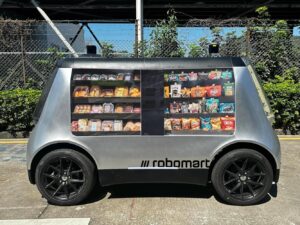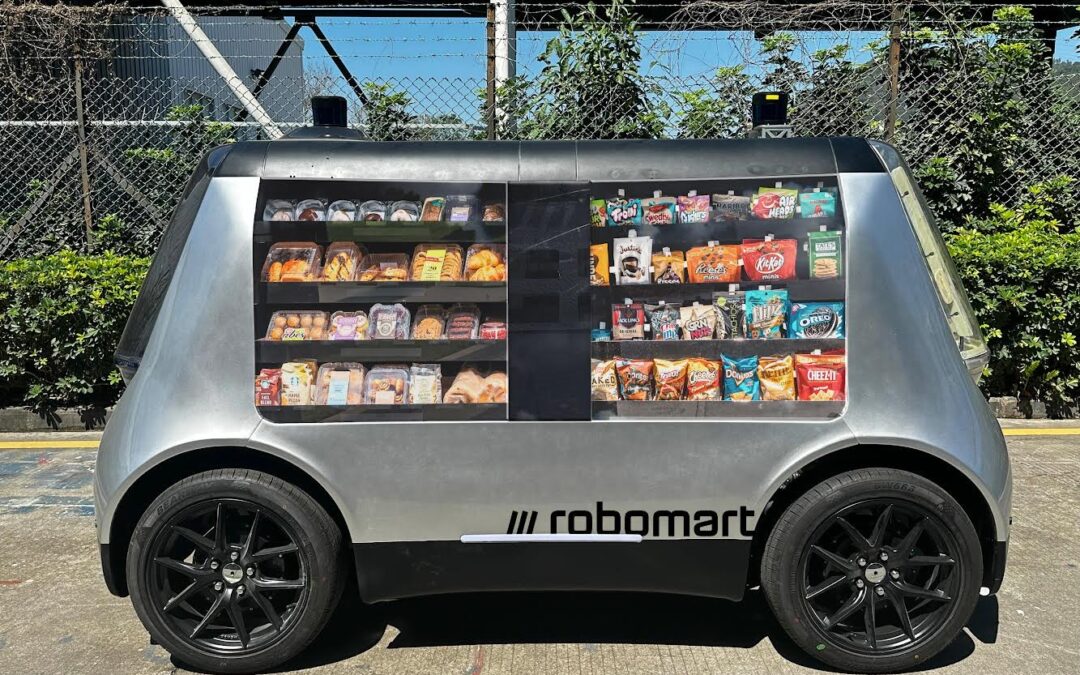Following an extensive beta testing phase in Southern California, Robomart has unveiled ambitious plans to expand its store-hailing platform with fully autonomous vehicles.
The Los Angeles-based startup plans to phase-in fully autonomous vehicles by late 2025 as it adds 102 stores-on-wheels to its fleet in the coming months. The vans, which sell ice cream and convenience store snacks, will start rolling out in late summer with deployment continuing for 12 months, Ali Ahmed, CEO and co-founder of Robomart, told Food on Demand.
Robomart is a direct-to-consumer platform that bills itself as an attractive option for retailers seeking to bypass third-party delivery services. According to Ahmed, the store-hailing platform is a cost-effective solution for merchants as it allows them to extend their reach without the need for traditional brick-and-mortar investments.
Store hailing is “fundamentally a better proposition” because there’s “no order basket creation. No pick and pack. No pickup orders,” Ahmed said.
In a strategic move to bolster its fleet of mobile stores, Robomart recently established the Autonomous Retail Collective. The collaborative network features industry partners dedicated to advancing self-driving retail solutions including Whale Dynamic, a specialist in self-driving software systems.
 Other key collaborators include RFID supplier Avery Dennison, fleet management company Zeeba, and autonomous vehicle manufacturer PIX Moving.
Other key collaborators include RFID supplier Avery Dennison, fleet management company Zeeba, and autonomous vehicle manufacturer PIX Moving.
“The Autonomous Retail Collective represents a significant leap forward in the evolution of retail,” Ahmed said. “By bringing together the best technologies across the autonomous vehicle and retail industries, we are building an unparalleled platform to transform how consumers shop and interact with their favorite retailers and brands.”
Robomart plans to deploy Whale Dynamic’s cutting-edge self-driving technology into mobile retail vehicles as part of its fleet expansion. Most will be located in the Los Angeles area, but two will be stationed in Boston.
Tigran Shahverdyan, co-founder of Robomart, said the Whale Dynamic “collaboration strengthens our mission to enable the near-teleportation of goods.”
David Chang, founder and CEO of Whale Dynamic, said: “Robomart’s innovative approach to retail aligns perfectly with our mission to transform transportation through autonomous technology. We are excited to work alongside Robomart and other ARC partners to bring fully autonomous, self-driving shops to life and reshape the future of retail.”
Robomart’s expansion is years in the making.
The company was founded in 2018, and began testing its store-on-wheels business model during the pandemic. Today, Robomart works with Unilever, Mars, Ben & Jerry’s, and Rainbow Foods. The first-gen vehicles, currently manned by a driver, also sell prepared foods.
Consumers initiate the ordering process by using an app to “hail” a store.
Similar to the experience with ride-sharing services like Uber or Lyft, a van arrives at their location within 5 to 6 minutes. Upon arrival, shoppers use the app to unlock the van doors. Inside, they select their desired products and walk away, bypassing the traditional checkout process.
RFID technology is used to calculate purchases without requiring any human interaction.
“Whatever you pick up off the shelf, it tracks,” Ahmed said. “So if you grab four items, and then you close the door, as soon as the door closes, it calculates the difference in inventory and that’s your basket.”
Consumers enjoy the convenience, Ahmed said.
In one 25-week trial period, one Robomart van saw 90% repeat buyers.
“Once someone hails a store, they are addicted to it,” he said. “It’s just the cheapest, fastest and most convenient way to get goods.”
Currently, Robomart vans stock pantry items as well as refrigerated and frozen foods. Looking to the future, Ahmed said plans are in the works to introduce vehicles equipped with heating capabilities, transitioning from store-on-wheels to restaurant-on-wheels.
“It’s definitely part of our future plans,” Ahmed said.
Nancy Luna is a contributing writer for Food on Demand. She can be reached at [email protected]


